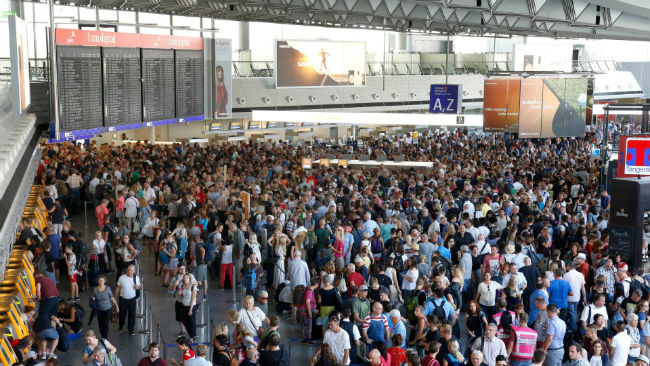Germany’s Frankfurt Airport was evacuated Tuesday afternoon (August 7, 2018), local time, after a security lapse in which a French family was released into a security area following a positive test for explosives. After being located and answering questions, the family was allowed to travel further.
According to reports, the German Federal Police evacuated airport gates A and Z in Terminal 1. The gates were opened a few hours later, but the Lufthansa airline said around 7,000 passengers were affected by flight delays and cancellations.
"The safety of our guests is the top priority at Frankfurt Airport. We apologize to all passengers and customers for their inconvenience and thank them for their calm and prudent behavior," said Anke Giesen, COO of Fraport AG.
A major world airline hub and Germany’s largest airport, Frankfurt Airport was the 14th busiest by passenger volume, processing 64.5 million passengers, according to 2017 statistics by Airport Council International.
Although the incident caused a manageable amount of chaos due to the volume of travelers in the facility, it is critical that airports and other areas where large amounts of people gather, such as meeting and convention facilities, have a written disaster management plan and procedures in place in order to maintain a safe environment and help mitigate legal liability for facilities and organizations holding meetings.

Terminal 1 Frankfurt Airport after clearing the security area A / Z
Accounting for Attendee Safety
According to Brenda Rivers, author of the new book The Meetings & Event Risk Management Guide, How To Develop A Customized Risk Management Playbook (stay tuned for more details on that from Meetings Today), meeting organizers and planners must perform and demonstrate an adequate level of “duty of care.”
According to Rivers, duty of care is defined as “a requirement that a person act toward others and the public with the watchfulness, attention, caution and prudence that a reasonable person in the circumstances would use. If a person's actions do not meet this standard of care, then the acts are considered negligent, and any damages resulting may be claimed in a lawsuit for negligence.”
Did you adequately plan for safe evacuation routes? Did you hire a properly vetted security company, and the right number of security personnel? Did you review the transportation provider's accident history?
Meetings Today Podcast: Navigating Chaos – Travel Tips for When Your Airport Falters
An organization’s duty of care is a legal duty with consequences. Meeting stakeholders and planners can be held personally liable for failure to meet their professional responsibility in areas such as:
- Conducting proper due diligence when sourcing a location and venue.
- Transportation arrangements and vetting the security of off-site activities.
- Informing attendees of potential threats.
- Providing attendees with critical emergency procedures, such as evacuation routes, exit strategies, medical assistance and security and law enforcement contacts.
Rivers believes that meeting planners are even more vulnerable since they handle a much larger amount of people and are generally expected to perform site inspections of facilities and activities as part of their job.
“When [or if an incident] gets challenged in court ... there’s [typically] going to be a higher level of responsibility for a meeting planner and a meeting organizer,” Rivers said. “Planners should know what to do. I really feel that a judge would probably assign a higher duty of care to a meeting planner because of the nature of work we do.”
[Before You Go: Safety Checklist for Transportation Services and Off-Site Activities].







